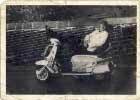Here's something I hadn't thought about until the weekend. When inserting new studs into a hub, should you stop them seizing with a some copper grease, or use some type of Loctite to stop them coming out?
Discuss.
LCGB Forums
The ability to post messages is restricted to LCGB members. Any questions contact us at lcgbadmin@googlemail.com
Hub studs
9 posts
• Page 1 of 1
Re: Hub studs
They cant come out because they have a left hand thread,so the tighter you fasten the wheel nuts,the tighter the studs get.
-

HxPaul - Posts: 1583
- Joined: Fri May 30, 2014 9:18 am
- Location: Halifax
Re: Hub studs
Not sure about putting anti seize grease on wheel / hub studs when I worked in HGV repair we were told to under NO circumstances to apply anything to the threads.
When the wheel nut is tightened up to the correct torque the stud should remain held like a normal nut and bolt.
One thing you could do how ever is put a mark Say with a paint pen or similar on the back of the stud and another mark on the hub as a indicator should anything come loose you would know instantly.
Incidentally I found the best way to remove hub studs when all else failed was to weld a piece of flat bar in the middle of the hexagon head ,then quickly into the vice the heat and the fact I now had a good grip of the bugger made them removable.
When the wheel nut is tightened up to the correct torque the stud should remain held like a normal nut and bolt.
One thing you could do how ever is put a mark Say with a paint pen or similar on the back of the stud and another mark on the hub as a indicator should anything come loose you would know instantly.
Incidentally I found the best way to remove hub studs when all else failed was to weld a piece of flat bar in the middle of the hexagon head ,then quickly into the vice the heat and the fact I now had a good grip of the bugger made them removable.
-

Phil D - Posts: 972
- Joined: Thu Feb 12, 2015 7:37 pm
Re: Hub studs
Belt and braces me, always put a drop of threadlock on for good luck
- gizmo
- Posts: 679
- Joined: Sat May 31, 2014 6:43 pm
Re: Hub studs
I hear what you are saying guys.
However, a dab of grease helps ward away the issues with having steel bolt in an ali thread in an exposed location. Getting seized studs out can be a pain, despite the tips given here by Phil D.
The LH thread should negate the need for Loctite, but as Gizmo says, people do apply Loctite for what they consider to be the right reason.
Let the debate continue.....
However, a dab of grease helps ward away the issues with having steel bolt in an ali thread in an exposed location. Getting seized studs out can be a pain, despite the tips given here by Phil D.
The LH thread should negate the need for Loctite, but as Gizmo says, people do apply Loctite for what they consider to be the right reason.
Let the debate continue.....
-

Knowledge - Posts: 1994
- Joined: Sat May 31, 2014 11:42 am
- Location: Ipswich
Re: Hub studs
Coppergrease for me, the times I've struggled getting siezed ones out without burning the paint off a good hub. Then a mate comes round and asks me to fit SIP rims and the studs come out easy without stripping the threads then I'm pleased I didn't use loctite.
- Wack
- Posts: 742
- Joined: Sat May 31, 2014 7:11 pm
Re: Hub studs
Would locktite not protect the studs from the dreaded steel/alloy seizures making them easier to remove than if nothing was applied to the threads?
-

Marty ULC - Posts: 610
- Joined: Sun Jul 20, 2014 7:28 pm
Re: Hub studs
loctite stops working at about 200c so I hold an old soldering iron ( big brass lump on a stick heated with a blow lamp) on to break the bond, or heat it directly if the paints not an issue, with loctite more is not better!
loctites just a plastic glue with a relatively low melting point max range is 380F
using the right grade of loctite is key to easy removal without heat,
Loctite 242 is nutlock easily dismantled with hand tools
LOCTITE 243 is the general thread locking stuff,medium strength
LOCTITE 270 studlock is high strength and will need heat to avoid damage dismantling
loctite can and does attack plastic ( abs crumbles) and possibly nylon so beware of belt and braces with nylocks
loctites just a plastic glue with a relatively low melting point max range is 380F
using the right grade of loctite is key to easy removal without heat,
Loctite 242 is nutlock easily dismantled with hand tools
LOCTITE 243 is the general thread locking stuff,medium strength
LOCTITE 270 studlock is high strength and will need heat to avoid damage dismantling
loctite can and does attack plastic ( abs crumbles) and possibly nylon so beware of belt and braces with nylocks
- steve c
- Posts: 46
- Joined: Fri Jun 20, 2014 9:43 am
Re: Hub studs
I use locktite 222 on all alloy/steel threads to minimise the steel alloy corrosion
- Meds
- Posts: 431
- Joined: Sat May 31, 2014 10:08 pm
9 posts
• Page 1 of 1
Who is online
Users browsing this forum: No registered users and 55 guests